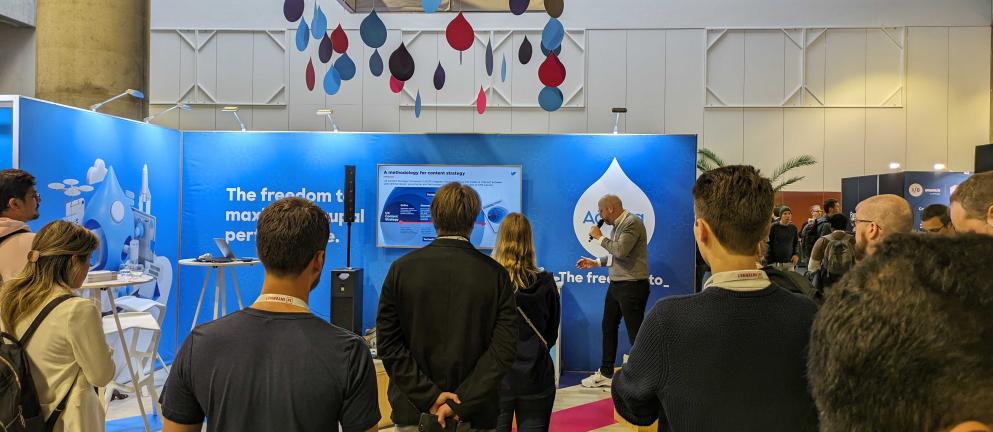
DrupalCon Lille: Why Accessibility and Inclusion Matter

As Dries Buytaert, creator of Drupal, noted in his Driesnote on day one of DrupalCon Lille, Drupal is committed to preserving the open web and the inclusion it prizes. So it came as no surprise to see several sessions on the conference agenda dedicated to accessibility, diversity, and inclusion. Here are highlights from just a handful of these sessions from the first two days of DrupalCon:
Accessibility is for everyone
Daniel Angelov, Quality Assurance Domain Knowledge Lead at FFW (an Acquia-preferred partner), led a session debunking common myths about accessibility, including that it’s:
- For blind or low-vision users only,
- For people with disabilities only
- Makes websites less visually appealing
- Too expensive and time-consuming
- Only necessary for large organizations or government websites
The session reminded us that accessibility is for everyone, not just those with a disability or impairment. Daniel stressed that it’s important to create accessible digital experiences, because we have an ethical responsibility to do so. It helps increase reach and enforce a positive brand image.
Tips for accessible and inclusive presentations
Just as accessible experiences aren’t limited to individuals with disabilities, accessibility isn’t solely about digital experiences either. AmyJune Hineline, Certification Community Architect for the Linux Foundation, delivered a session on giving accessible and inclusive presentations, both in-person and virtually. Inclusion doesn’t mean special privileges, she said. Accessibility is a basic human right, and according to the Web Content Accessibility Guidelines (WCAG), it follows four basic principles, abbreviated as POUR:
- Perceivable: Users can identify content and interface elements through their e senses.
- Operable: Users can successfully use interactive elements.
- Understandable: Users can comprehend the content and learn how to use the interface.
- Robust: Users should be able to use their chosen technology.
AmyJune then offered the following tips (and many others!) to help make presentations as accessible and inclusive as possible:
- Design your slides in the right aspect ratio and keep your content away from the sides of the slide.
- Leave rooms for captions.
- Use unique titles for each slide.
- Break up the content.
- Select basic, simple, and easily readable fonts.
- Avoid using all caps, because it renders text as one shapeless block that decreases readability.
- Use sufficient color contrast.
- Describe your images and provide context.
- Use your mic.
- Provide materials ahead of time.
Content strategy and inclusion meet DXP
Jason Greenspan, Senior Business Development Manager at Acquia-preferred partner Cyber-Duck, delivered a 15-minute Lightning Talk at the Acquia booth that teased our co-hosted workshop on digital inclusion. Echoing AmyJune’s belief that accessibility is a basic human right, Jason shared Cyber-Duck’s five pillars of digital inclusion, which are all different but interconnected:
- Accessibility: Cater to people with temporary or situational disabilities
- Connectivity: Access to digital, like mobile and broadband infrastructure
- Affordability: Ability to use and pay for services, like mobile networks
- Literacy: Technical understanding on how to use digital platforms
Safety: Protect data and security from online fraud and abuse
Image
Cyber-Duck's Jason Greenspan leads a Lightning Talk at Acquia's booth
Jason noted that, when you don’t create an accessible and inclusive digital experience, you essentially ignore an entire swath of people. He drove this point home with sobering statistics:
- About 15% of the global population (over 1 billion people) live with a disability, which doesn’t include those with cognitive or mental challenges.
- In the UK, 22% of the population has a disability.
- In the U.S., 25% of the population is affected by a disability.
If you’re at DrupalCon tomorrow and interested in learning about creating a content strategy that takes inclusivity and accessibility into account, tickets are still available for our workshop.
Advice for the neurodivergent
First-time speaker and first-time DrupalCon attendee, Mathieu De Meue, Full Stack Drupal Developer at Calibrate, shared his “inclusive fairytale as a Tourettes-afflicted Drupal developer.” Diagnosed with Tourettes in 2009, Mathieu discussed the tics disorder: It’s chronic, can be vocal or motoric, affects one out of every 1,000 people, and is most commonly in combination with ADHD, ADD, and autism disorder.
Mathieu then shared his experience navigating the workplace when you have Tourettes from the application stage to onboarding and being on the job. Between quippy, inspirational sayings like “You do you!” and “Always believe in yourself and chase your dreams!”, Mathieu stressed the importance of communication. While his advice targeted neurodiverse developers, his tips are useful for most people in the workplace:
- Ask for help when you need it.
- Communication is key; express your concerns and expectations.
- Don’t take things personally.
- Find a coworker you can trust.
- Be honest about your feelings.
- Try to find a solution together with your team.
It’s been great to see firsthand the Drupal community members here at DrupalCon bringing their whole, authentic selves to the exhibit floor, keynotes, as well as various breakout sessions — and embracing their fellow community members as their whole, authentic selves too.
To learn more about the value of creating inclusive digital experiences, check out our infographic.
